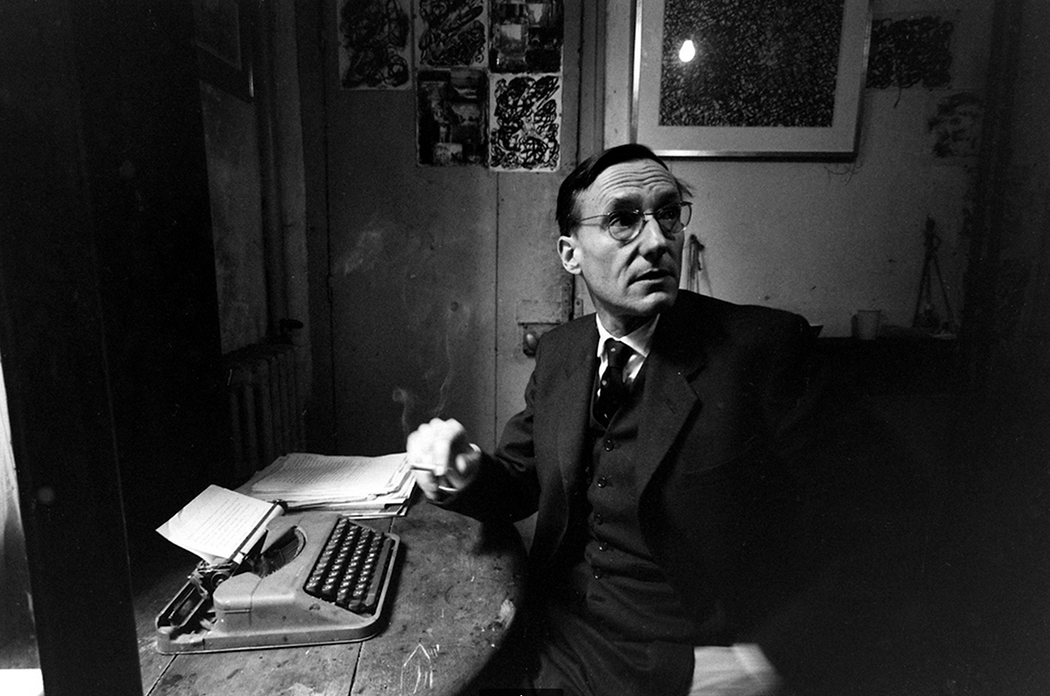William S. Burroughs

I’ve always been fascinated by the The Midwestern US and its history, the people and the culture. Flying over the Midwest, I am always captivated by the landscape— the farms, the space, the flatness, the straight roads that connect the small towns.
William Burroughs was born in 1914 in St. Louis, Missouri. His journey through life was a wild ride. Like most young men of his era, he was expected to charter a course that was predictable and conforming. However, his path had no signs of predictability or conforming to society or preconceptions. He was a writer, a painter and a performer of the spoken word. His relationship with Allen Ginsberg and Jack Kerouac became the foundation of the Beat Generation.
The dark side of Burroughs is mysterious and alluring in the same way a scary movie has you screaming “Don’t go in there!” yet you can’t stop watching and awaiting the next move. His heroin addiction and experiments with other drugs seem to have been at the helm of his wild ride.
An interesting interview with Burroughs in the Paris Review in 1965 paints a multidimensional picture of his thought process and organization of ideas that I find fascinating. It speaks to the concept of “seeing” that I believe is critically important and feels like a lost sense today, with the excessive imagery and visual and audio noise that is blasted at us every day. “Seeing” to me is a lot more than having vision in terms of eyesight. It’s about allowing yourself to connect some dots in your mind that weave together clues that are around us at all times, but get hidden behind mundane thoughts and activities. It’s about seeing beauty in reality and not letting some long standing notion of beauty fence you out of awareness.
A beautiful bouquet is an example of this idea. Once the flowers and leaves start to wilt and change color, most people think its over. But its just beginning, that’s when it gets really beautiful… the unexpected shapes and colors and the slow dance it does as it twists and folds around itself. That process connects a lot of dots, such as how we perceive beauty, how little patience we have or how close-minded most people are about what’s around them and how things might relate to one another. “Seeing” is about taking it all in and seeing things from many angles, connecting it to experience or allowing it to inspire and inform ideas. — angela
The following images are from LIFE Magazine. Excerpts of the interview are from Paris Review. Please read the full article here.
INTERVIEWER
You grew up here?
WILLIAM S. BURROUGHS
Yes. I went to John Burroughs School and the Taylor School, and was out West for a bit, and then went to Harvard.
INTERVIEWER
Any relation to the adding-machine firm?
BURROUGHS
My grandfather. You see, he didn’t exactly invent the adding machine, but he invented the gimmick that made it work, namely, a cylinder full of oil and a perforated piston that will always move up and down at the same rate of speed. Very simple principle, like most inventions. And it gave me a little money, not much, but a little.


INTERVIEWER
What did you do at Harvard?
BURROUGHS
Studied English lit. John Livingston Lowes. Whiting. I sat in on Kittredge’s course. Those are the main people I recall. I lived in Adams House and then I got fed up with the food and I moved to Claverly Hall, where I lived the last two years. I didn’t do any writing in college.
INTERVIEWER
When and why did you start to write?
BURROUGHS
I started to write in about 1950; I was thirty-five at the time; there didn’t seem to be any strong motivation. I simply was endeavoring to put down in a more or less straightforward journalistic style something about my experiences with addiction and addicts.


INTERVIEWER
Why did you feel compelled to record these experiences?
BURROUGHS
I didn’t feel compelled. I had nothing else to do. Writing gave me something to do every day. I don’t feel the results were at all spectacular. Junky is not much of a book, actually. I knew very little about writing at that time.
INTERVIEWER
Where was this?
BURROUGHS
In Mexico City. I was living near Sears, Roebuck, right around the corner from the University of Mexico. I had been in the army four or five months and I was there on the GI Bill, studying native dialects. I went to Mexico partly because things were becoming so difficult with the drug situation in America. Getting drugs in Mexico was quite easy, so I didn’t have to rush around, and there wasn’t any pressure from the law.


INTERVIEWER
Why did you start taking drugs?
BURROUGHS
Well, I was just bored. I didn’t seem to have much interest in becoming a successful advertising executive or whatever, or living the kind of life Harvard designs for you. After I became addicted in New York in 1944, things began to happen. I got in some trouble with the law, got married, moved to New Orleans, and then went to Mexico.
INTERVIEWER
There seems to be a great deal of middle-class voyeurism in this country concerning addiction, and in the literary world, downright reverence for the addict. You apparently don’t share these points of view.
BURROUGHS
No, most of it is nonsense. I think drugs are interesting principally as chemical means of altering metabolism and thereby altering what we call reality, which I would define as a more or less constant scanning pattern.